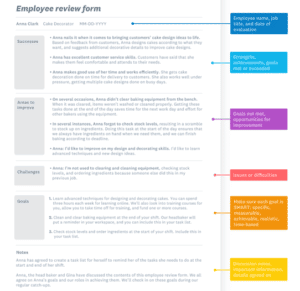Your heart begins to race, your palms get sweaty, there might even be drops of sweat forming on your forehead. Clearly, you’re anxious.
I’m guessing this description is familiar to all of us. Since this is a blog about HR themes, I’m also guessing you know that short description isn’t a reference to a first date or being called into your child’s school to discuss an incident. Rather it’s about the annual performance appraisal. Does this appraisal sample look familiar?
Most performance appraisal processes fill us with anxiety, whether you’re an employee or manager. Why is that? Because both parties know that the process is terribly flawed and no one likes completing a process that is broken and might even do more harm than good. Experts know the process is flawed. The problem was featured in an HBR article in 1976! The problems with performance appraisals are neatly summarized in Marcus Buckingham’s work:
- Ratings are biased because they carry what’s called an idiosyncratic bias. This means that the appraiser’s assessment is actually a reflection of the raters rating themselves. This means the appraisal is actually a mirror for the manager not a lens through which to see the employee’s behavior.
- Data insufficiency – managers don’t have enough data. We are asking raters to assess complex behaviors like collaboration, strategic thinking, and creativity but no rater really has enough data to do that.
A common response to these criticisms is the multi-rater 360 appraisal that averages the results of all the raters. Buckingham points out that averaging 5 or 6 bad results does not yield 1 good result. Rather the composite is simply the average of the six flawed ratings.
However, reform is hard. In spite of all the research and recommendations to NOT use annual performance appraisals, firms continue to do so, and millions are spent on software to automate the process. Having worked and managed in large, medium and small firms for 40 years, my view is that firms continue to use these flawed processes because they have not figured out a better alternative. They try to fix the biggest flaws and tolerate the smaller ones. McKinsey tells us that firms need to assess workers to manage their firm. So, if an easy alternative were available, firms would line up for the remedy!
Many firms have tried to reform their worker performance management processes. Unfortunately, Gartner’s research points to several failed examples and few successes. So, what to do?
Be the pragmatic manager. That means two things:
- Make the best of (do no harm?) and work inside your firm’s performance management system because you’re not going to change it anytime soon. These performance systems are bolted into the management culture and processes of most firms.
- Take care of your team by being the best coach you can be.
What does ‘being the best coach’ mean?
Good question. Coaching your team is a big topic. In the context of this blog, I focused on an alternative to the annual appraisal process and the research from Marcus Buckingham. (His last two books deserve a place on your bookshelf … Nine Lies about Work and Love and Work)
Buckingham has a simple replacement for the annual appraisal process. Use a 15 minute weekly 1:1 check-in with each of your team. The content of the check-in is secondary to the frequency. His research at Gallup and the ADP Institute tells him that using the weekly check-ins will, over time, grow your team’s trust in you. Your team will see tangible evidence of your accountability to sustain the process. From that growing trust you’ll be able to coach them to better performance. Here are the four weekly questions:
- What activities did you love last week?
- What activities did you loathe last week?
- What are your priorities this week?
- What help do you need from me as your team leader?
(Buckingham, Marcus. Love and Work (p. 186). Harvard Business Review Press. Kindle Edition.)
To recap, your role as manager/supervisor is a position of trust. Your team depends on you and your firm does as well. The annual appraisal is ineffective but do your best to put up with it. But don’t stop there. Do your homework and read Buckingham or watch his video series and commit yourself to being a better coach. Your team and your boss will thank you.



